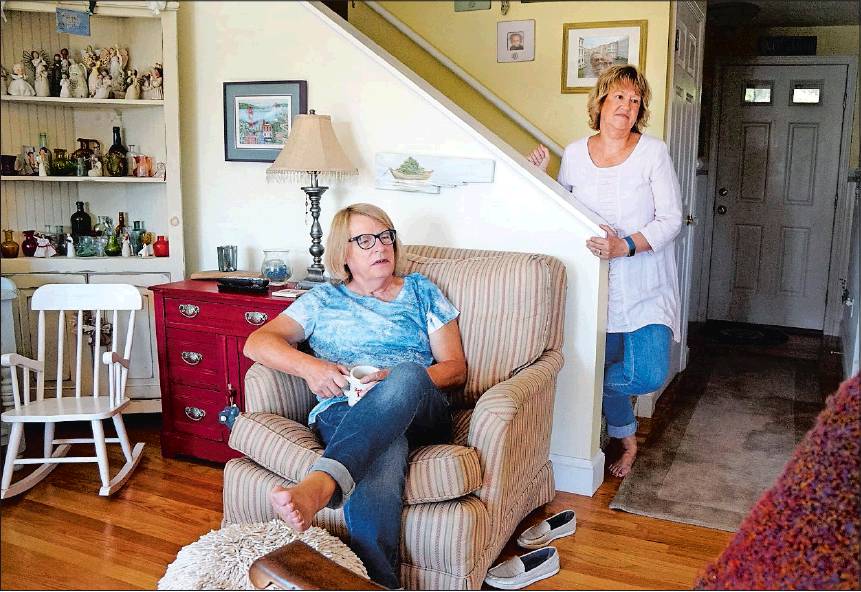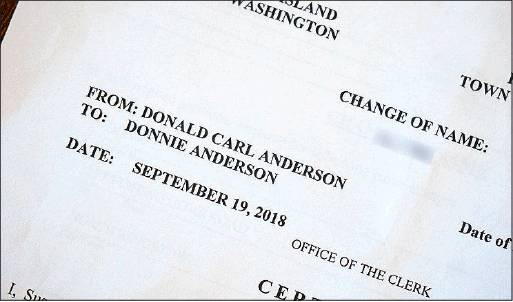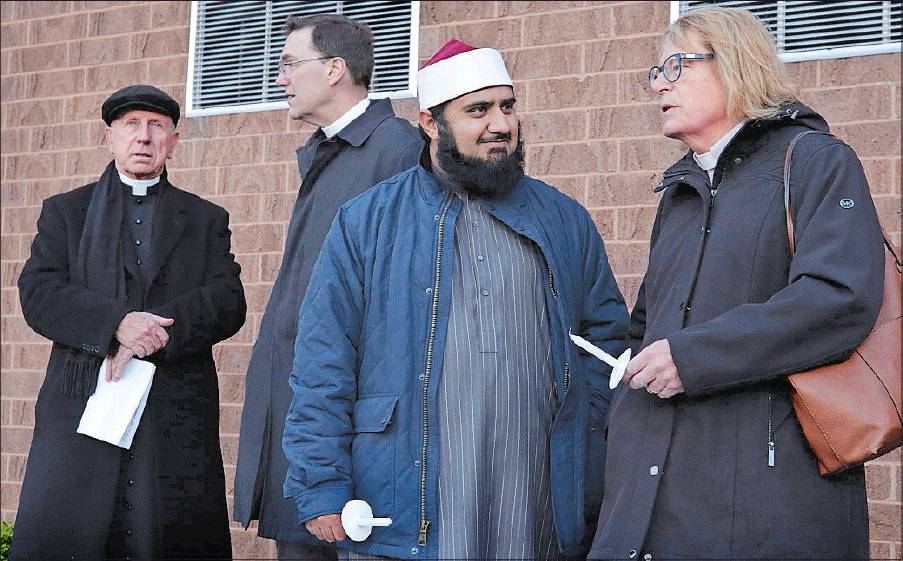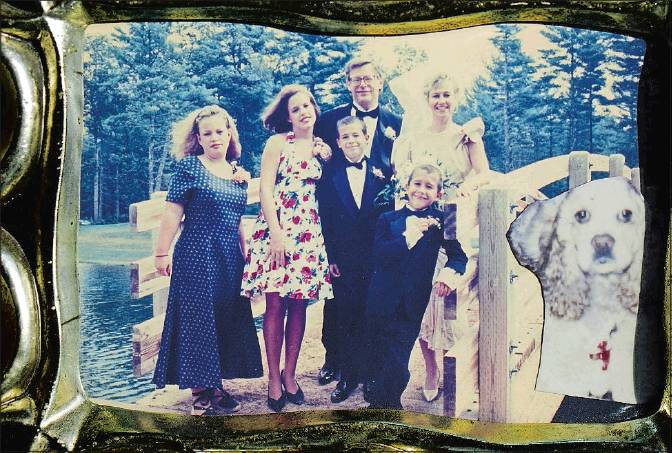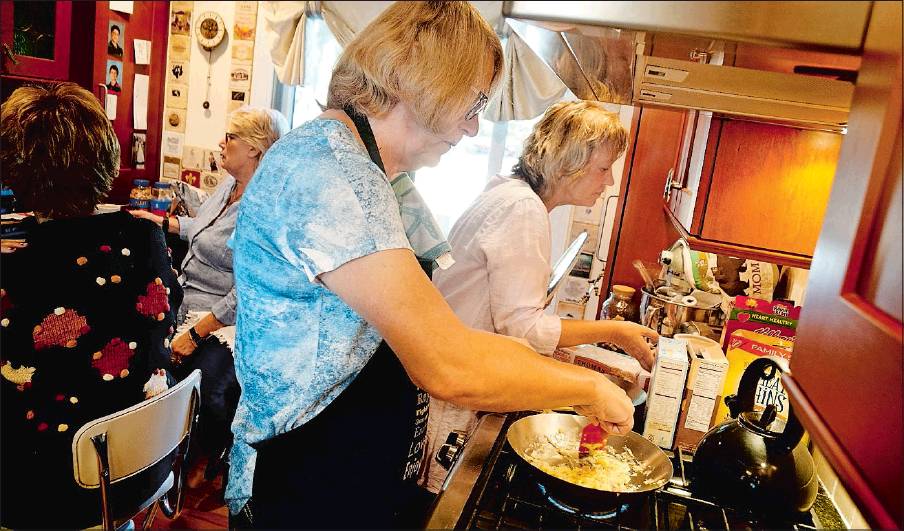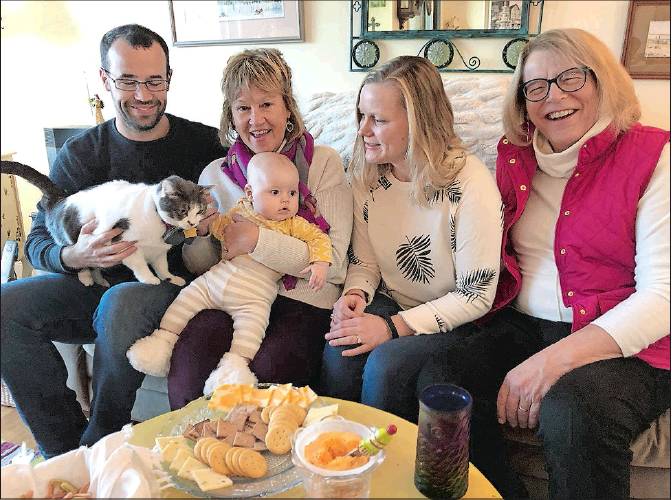UNCOUPLING
When one spouse transitions to another gender after 23 years of marriage, how do you reinvent the relationship? Last year, Donnie and Debbie set out on a journey with no map.
By Karen Lee Ziner Special to The Journal
I NORTH KINGSTOWN n August 2017, the Rev. Donald C. Anderson set an inescapable deadline. The women’s clothes from Kohl’s were due to arrive any day.
There was no way out: Donald’s wife, Debbie, would finally have to learn a secret that had been buried like a stone in the sea.
On the morning of Aug. 20, Donald asked Debbie to sit down: there was something to tell her. As usual, Debbie chose the living room sofa, Donald the rocking chair. Family photos reflecting 23 years of marriage — a second marriage for each — surrounded them. Donald, then 69 and executive minister of the Rhode Island State Council of Churches, searched for nuance and grace, but found none.
“I am transgender,” Donald blurted. “I am a woman.”
Debbie, now 64, had always perceived her husband as “a guy’s guy, masculine, athletic.” She heard the word “transgender,” but it failed to register. Her ears began ringing.
“Don’s mouth was moving,” she recalls, “and I didn’t hear anything after that.”
A protracted, parallel journey of anguish and self-discovery followed for both. Ten months later, Anderson began living openly as a woman, requesting that people call her Donnie and refer to her as “she” and “her.”
Angry and shattered, Debbie wondered: could they possibly stay together? Or would this revelation spell an irrevocable end to their marriage and family life?
Within days of Anderson’s revelation, the women’s clothes from Kohl’s began arriving. Instead of the expected single package, multiple boxes arrived, day after day.
“Death by a thousand needles,” Donnie recalls. “Salt in the wound,” Debbie says.
Debbie pleaded, tried to bargain: “‘Do you have to do this? Can’t you just do this on weekends, at home?’
“[Donnie] didn’t want to take it to the grave. I said, ‘I wish you had.’ … It was mean, but it was how I felt.”
Donnie Anderson, who has devoted her life to pastoral care of others, felt acutely vulnerable. “I remember someplace in those first couple of weeks, actually being in my bed, literally in a fetal position …
“It was a very raw time emotionally for both of us. We were both in places that we’d never been before,” Donnie says. “It was just hard to know what to do.”
They moved into separate bedrooms. Tensions festered.
Two days after her world crashed, Debbie desperately needed to leave the house. She sought out close friend Pamela Childs and Childs’ wife.
“I couldn’t stop crying. Couldn’t stop crying,” says Debbie. “They were very compassionate, very loving. They were like, ‘Emotional intimacy in a marriage is much more important.’ I kept saying, ‘I like men. I am very comfortable with my gender. I know who I am. I don’t want a wife. ... I didn’t sign up for that.”
She didn’t see how it could work. “We had to get a divorce, but I didn’t want a divorce.” Retirement was approaching. They had travel plans. They had children and grandchildren.
Childs, a magazine publisher, says Debbie is like a sister to her. The news that night “was a surprise, to say the least,” she says. “I just felt so much empathy for both of them.”
Having come out as gay 20 years ago, Childs understood Donnie’s silence. She also understood Debbie’s pain. Childs encouraged Debbie to “stay in the moment” as she tried to move forward.
Debbie felt “a little calmer” but remained in shock. She also immediately began therapy.
In the ensuing weeks, Donnie and Debbie told a select few family and friends.
Donnie confided in Rabbi Alan Flam, leader of the Soulful Shabbat Community and former president of the Board of Rabbis of Greater Rhode Island. Flam and Anderson are founding members of the Rhode Island Interfaith Coalition to Reduce Poverty, and they have also become friends.
The news was unexpected, Flam recalls, but “the way that Donnie talked about it that day, there was something about it that just felt very true to me ... I just tried to listen with an open heart to this person I know and respect and really care for.” Flam told Donnie that he stands by her, as a colleague and a friend.
Donnie and Debbie told Debbie’s sons and spouses via video chat. Her son Adam, 34, a high school science teacher, said the revelation made no difference. Donnie was still “a wonderful influence on my life, a great role model.”
And they invited Donnie’s two daughters and their spouses to the house for coffee.
Bekah Greene, 42, expected her father was going to tell them he had decided to run for public office, something Donnie had been weighing. But that was far from the message, and Bekah “was shocked and confused.”
She and her sister, too, had a journey ahead.
One summer morning, Donnie Anderson arrives at Olga’s Cup & Saucer in Providence. Her gray hair has been dyed back to its original dark blond and coiffed in a chin-length bob. She wears clear nail polish, contemporary blue eyeglasses and a T-shirt knotted at the waist.
She has begun gender-affirming hormones that induce feminization, such as breast development and softer skin and hair, under the care of Dr. Michelle Forcier, director of Gender, Sexuality and Reproductive Health Clinics for Hasbro Children’s and Rhode Island hospitals.
Other hormonal effects can include muscle and fat changes for a more “female body shape,” as well as mood changes, including a better sense of well-being “when gender and body are more congruent,” Forcier said.
Raised as a conservative evangelical Protestant, Donnie says, “I was very right-wing. When I was a teenager, I thought Billy Graham was a liberal.” Her attitudes shifted in college. And in her early 30s, she became affiliated with the more liberal American Baptist denomination.
“I had been pastoring at a church in Connecticut, and was the only pastor in that denomination in New England who believed in the ordination of women,” she recalls. “My openness didn’t fit there.”
Her gender dysphoria dates to childhood. She didn’t know what was wrong, but she knew she was different.
She was drawn to “the feminine.” The powder puff in her aunt’s bedroom. A basket of her mother’s clothes. While her brother Paul went on outings with her father and uncle, she preferred to spend time with her mother and aunt — a preference that her mother clearly discouraged.
If anything, “They probably thought I was gay,” says Donnie. “But I was never attracted to men. So, I knew I wasn’t gay. … I just said, ‘Well, that’s not who I am.’”
Not until she was exposed to “the concept of transgender” — a person whose assigned gender at birth does not match the gender they identify with — did a switch click on: “I went, ‘Oh, maybe that explains who I am.’”
But at nearly 70, she could not face hurting her family. She believed that coming out as trans-gender would end her role as a faith leader and affect her public life. Eventually, tension created physical and emotional distress, and she had a “sense of the finite.”
“I didn’t want to be buried not having lived as I authentically am. … I just couldn’t stand it anymore,” Donnie says. “It was on my mind all the time.”
Finally, she decided to own it: “I am a woman in a male body.” Declaring that freed her, but there were still concerns.
“I just wanted to be taken seriously,” she said. “I wanted to be treated with respect.”
Hesitancy shows on Debbie’s face during her first interview with a reporter. Fellow customers at Sin bakery in Providence tap away on laptops. Some are within earshot of this extraordinarily painful conversation.
Debbie at times seeks reassurance from Donnie, who has accompanied her. Once or twice, Debbie’s eyes mist over and her warm, open expression grows wistful.
The two met more than two decades ago at the First Baptist Church in East Greenwich, where Donnie would eventually serve as pastor for about seven years.
Both were divorced. Donnie had two teenage girls. Debbie had two young boys.
“My friends said, ‘He’s a great guy,’” Debbie says. “And that’s what I thought — just a nice, cool, regular guy.”
And sensitive. One night after a date, for example, Debbie found a wounded rabbit in her driveway. “I called Don. He drove 20 minutes to get here. He stitched the bunny. Put it on a heating pad.” A deal-clincher.
Donnie loved Debbie’s gift of empathy, calling her “one of the most caring people I know.”
They raised their children together, in cooperation with the other parents. They joined in community events, hiked, kayaked and traveled. At the same time, they remained “pretty independent.”
Debbie continued her longtime sales career at The Allied Group in Cranston. Donnie’s ministry and social justice advocacy increased her public profile, and stature.
Long before coming out as transgender, she worked within Rhode Island’s LGBTQ community. Advocated for the poor, and for immigrants. Spoke healing words at rallies. She and Debbie joined the 2017 Women’s March in Washington.
Throughout, she compartmentalized. There was the Rev. Donald C. Anderson, and, inside a male body, the woman she knew herself to be.
“Transgender” had never crossed Debbie’s radar, however, until she learned about retired Olympic gold medalist Bruce Jenner’s transition to Caitlyn Jenner.
“I felt a lot of compassion for that, until it came into my world
”
…
As Donnie told more and more people and was moving toward her “happy place,” Debbie says, “everything in my life was just kind of going south. I really thought we had a good marriage. It just came out of nowhere.”
Debbie entered treatment with Isabel M. Storey, a licensed mental health counselor in Rhode Island.
“She saved my life,” Debbie says. “She just brought me back to sanity. A place where I could wrap my head around the whole situation and just get my bearings back.”
But other connections eluded Debbie. Therapy aside, “there was no help for me in my situation … no help for spouses.” No one who understood.
That changed in February, when Donnie invited Debbie to the 2018 “First Event” in Marlboro, Massachusetts, a conference for “transgender and gender non-conforming people, and those who love and support them.” January will mark its 39th year. It typically attracts up to 800 people.
At the conference, Debbie found the sign for the “SO’s” (spouses or significant others only) session on a meeting room door. All of them were women.
“I told my story,” she says. “I cried all the way through. I stayed in that room all day.” She connected with a small group of women who found themselves “in a club that we never would have imagined.”
“It was like, ‘Here they are. I’ve been waiting for you girls,”’ Debbie recalls. “They gave me encouragement. They gave me hope. They gave me strength. … We all agree, something very special happened that day … we were like magnets.’’
Afterward, half a dozen of them shared contact information, agreed to support one another, and made plans to get together. Debbie went home that evening. Donnie stayed.
That next day, for the first time, Donnie dressed publicly as a woman and wore makeup. Donnie called Debbie from the car on the way home, to alert her.
“You can’t come in the house like that,” Debbie said.
Donnie offered to run up the stairs while Debbie closed her bedroom door. Debbie wasn’t having it.
Donnie pulled over and changed on the way home.
The news broke publicly in mid-May 2018. The Council of Churches’ governing board president, Chontell Washington, informed members of the Rev. Anderson’s pending three-month sabbatical to begin a gender transition. The board gave its full support.
The story was everywhere. TV. Radio. Print. Online.
“We live in a condo. I thought, ‘What’s going to happen — are they going to throw us out?’ Are we going to lose our home?”’ Debbie says. “There are a lot of people who don’t understand. They’re afraid ...”
To Debbie’s relief, her coworkers at The Allied Group immediately embraced her, and overall, the support “was very positive.’’ She and Donnie received cards and phone calls from friends, neighbors and well-wishers from near and far. Five rabbis sent Donnie a gift certificate to Nordstrom.
Donnie says there are also “people who say, ‘I don’t necessarily agree. I don’t necessarily understand, but I accept it. ... They didn’t sever ties.”
Donnie emphasizes that while it has not been easy for her, “I have received a wonderful amount of support. But that’s been my story — it’s not everybody’s story. … There are a lot of people who really suffer.”
That is especially true of younger people whose families don’t understand, or don’t get them the appropriate medical or emotional support, she says. Suicide rates are high in the transgender community. The rate of hate crimes — including murders — is also high: 2018 has already seen at least 25 trans-gender people in the U.S. fatally shot or killed by other violent means, according to the Human Rights Campaign.
There have been a few detractors and disappointments. That includes people from Donnie’s past, “when I was in a much more conservative place.” Some of it was vile. A friend since childhood taunted Donnie on Facebook and sent a letter to their college classmates.
At her core, Donnie says, “I am a pastor.” Skepticism and rejection by some people she has connected with in that context have been disappointing.
That includes institutions where she has pastored people and individuals she has met “in a variety of pastoral situations,” from weddings and funerals to hospital bedsides, and even confidential chats at the State House, where she often speaks at rallies.
As Debbie says, “It’s been painful because we’ve lost friends … There are some people who we were close to who are probably going to drift out of our lives. I can look at them and say, ‘Don was with you when your mother died. He was with you when you had cancer. … He was with you when you had life-threatening surgery …
“It’s not right. We have to do better as a society in not judging.”
This past June, Donnie and Debbie decided to take a planned 10-day vacation to Italy, despite tensions. Being an ocean away from home brought relief.
One night, tired of sightseeing, they stayed in and watched the BBC drama “Call the Midwife.”
“It was pretty entertaining,” Debbie recalls. “We were laughing. It was the first time in a long time that we’d laughed. And I thought, ‘Gee, do you think we could do this? As friends?’ That was the time when we realized, maybe we could make this work.”
They agreed to continue living together, but drew boundaries. They had already moved into separate bedrooms and ceased physical intimacy; now Debbie insisted they further “uncouple.”
She told Donnie, “I have to return to my maiden name. I have to detach.”
Only with those boundaries could Debbie move forward as friends.
On Sept. 17, their 24th anniversary came and went with only an exchange of “friendship cards.”
Two days later, they appeared before Judge Brian A. Fielding at the North Kingstown Probate Court, a small, quiet room in Town Hall.
Donnie’s petition requested a name change from “Donald Carl Anderson” to “Donnie Anderson.” Debbie’s requested a return to her maiden name: Jamieson.
“The judge was very nice, kind and compassionate. He knew what the case was. He told Donnie, ‘I’ve seen your story, I read your story. I just want to tell you how courageous and brave I think you are,’” Debbie recalls. “Then Don started to cry.”
The judge turned to Debbie, addressed her by her new-old name, and expressed admiration.
“This is what I want to do,” Debbie told him. “I want to do this for myself.”
She explains, “To me, this was like an actual divorce. This was like a divorce in front of a judge. I don’t feel married anymore. I wanted to reclaim my identity.”
She asked Donnie to refer to her as “Deb,” not “my wife, Deb.”
Donnie Anderson returned to work in September, continuing the role as Council of Churches executive minister in which she has served nearly a dozen years.
She describes herself as “a work in progress,” emotionally and physically.
The feminization hormones are having an effect. Given her age and the attendant risks, she doubts she will have bottom surgery. Top surgery is an open question.
Though surgery “is the first thing everybody thinks of … the major part of transitioning is figuring out who you are inside, and in as an authentic a way as one can,” she says emphatically. “And that may or may not involve surgery.”
Donnie says, “While many people have a notion that a trans woman needs to ‘pass,’ it’s who you are inside.” As for the exterior, “it’s a spectrum.”
She is mindful of social and physical risks. “I would not go into a men’s room now in Rhode Island. But I feel perfectly comfortable here. No one has made me feel threatened or scared.”
“I do think about where I’m going, and what I’m doing.” While traveling, particularly on business, she avoids areas where the social climate is less tolerant.
Her transition has also led her to join, as an associate member, Central Congregational Church, in Providence.
She is increasingly comfortable with her identity. “I believe God made me this way for a reason. I was born to be transgender. It affords me the perspective of seeing life from both sides.”
More than a year after Donnie announced she is transgender, Debbie feels more grounded. The five women she met at the First Event conference remain a lifeline: they often go out or away for weekends, including with their spouses and significant others.
“I love them,” Debbie says. Meeting them “was a turning point in my life.”
Storey, who remains Debbie’s therapist, says the adjustment in this case “is like adjusting to a death of sorts,” with stages of loss and grief: typically denial, anger, bargaining and acceptance.
“Acceptance doesn’t mean you have to like it,” says Storey. “It means accepting.” She adds, “Debbie could have said, ‘I’m out of here.’ Instead, she became the hub of the family. It’s a complex and evolving love story.”
Perhaps. But heartache lingers. “There are always bumps,” Debbie says. “It’s sad. It’s just very sad.” And at times, frustrating.
They are, however, adjusting and moving forward. Donnie credits Debbie for her strength and courage, including drawing the family together. “We are committed to working together,” Donnie says. “We are two people who care very deeply about each other.”
And Debbie is “on board.” She goes shopping with Donnie and advises her on wardrobe choices. She wants to help Donnie be “the best woman she can be.”
Debbie and Donnie attended Joe Biden’s appearance at a pre-election Democratic rally in Providence and laughed over a “selfie” with the former vice president.
Debbie also worries less about what other people think. And she has helped Donnie’s two daughters — who saw a therapist, too, after Donnie’s revelation — to come to terms with it. “I was determined we were going to come through this,” she says. “That was the mindset; as a family, we could figure it out …”
In turn, Bekah has explained the situation to her daughter, Gracie, now 5.
Bekah struggled with words at first. Gracie had always called Donnie “Morfar,” a Swedish word for grandfather. Then “… we just kind of said, ‘Morfar is going to be in different clothing. Morfar is a woman now.’
“And in her own little way, she was like, ‘OK, Morfar is a girl.’ We just made it no big deal.”
Meanwhile, the uncoupling continues.
Debbie will begin using her maiden name again — likely this month or next — once she completes the paperwork: license, Social Security card, passport, etc.
She and Donnie will then stop wearing their wedding rings, and tuck them away.
“I’m better than I was,” Debbie says. She has grown and changed, learned a lot more about what she will tolerate and what she won’t. She found strength she never knew she had: “I pulled it up from somewhere …”
She wants people to understand that being transgender “is not a choice. It is what it is.” People need to be educated so they “can open their eyes and hearts” to individuals who are simply trying to live their lives.
She wants to help other spouses and partners in her situation. For the longest time, she says, “I was very, very lonely.”
“My husband melted away. Don is gone. Now there’s Donnie. I accept it. I may not understand it — but I accept it.”
Together they are trying to create “a loving and new reality” based on unconditional caring, “while giving space to live our own authentic selves.”
“It’s not the journey I bought the ticket for,” Debbie adds. “But I’m on it.”
On Twitter: @karenleez
ONLINE » Hear the Rev. Donnie Anderson discuss her transgender journey on providencejournal.com
